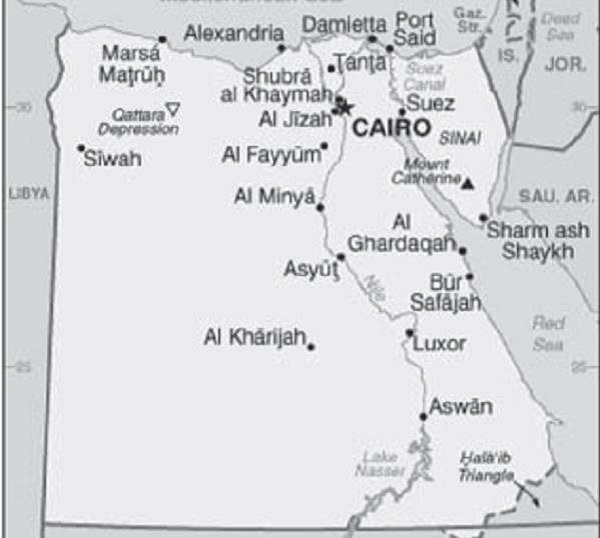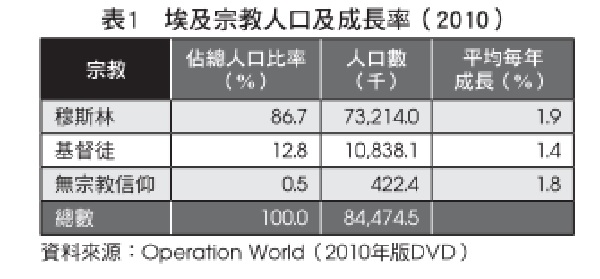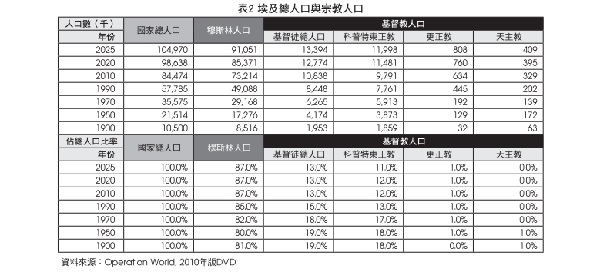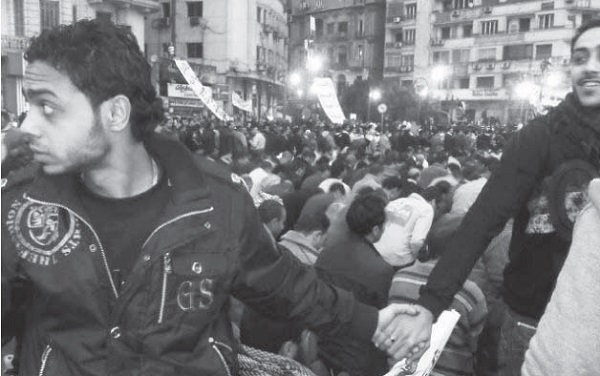Egypt's Political and Economic Situation and the Development of Christianity

In that day there will be a highway from Egypt to Assyria. The Assyrians will enter Egypt, and the Egyptians will enter Assyria; and the Egyptians will worship the Lord together with the Assyrians. In that day Israel will be one with the three kingdoms Egypt and Assyria, and they will be a blessing to the people on the earth; for the Lord of hosts will bless them, saying: Egypt is my people, Assyria is the work of my hands, Israel is mine Blessed are all the industries! (Isaiah 19:23-25)
1. The Bible predicts that God will take care of Egypt in the last days
The Union Version of the Bible mentions Egypt a total of 695 times. Starting from Genesis 12:10, it is recorded that the land of Canaan suffered a great famine, forcing Abram and his wife to go down to Egypt and live there temporarily. The last time it appears is in the Book of Revelation. Chapter 11, verse 8:
"Their dead bodies fell in the streets of the great city, which is spiritually called Sodom, and also called Egypt, where their Lord was crucified."
It can be said that Egypt is mentioned in all the books of the Bible from the beginning to the end - thirty-one of the thirty-nine books of the Old Testament and five of the twenty-seven books of the New Testament.
1948年以色列復國以來,埃及與以色列發生多次戰爭,直到1979年兩國簽訂和平條約,才暫時維持兩國間的平靜,埃及也成了以色列在中東地區的重要戰略夥伴。1
Although Egypt is an ancient civilization, it is still a moderately developed and relatively poor country. The majority of the people believe in Islam and are often in tension with the minority Christians, especially in recent years. However, the Bible predicts that God will still visit Egypt in the last days, declaring that the Egyptians and Assyrians will worship God together, and that God will bless Israel, Egypt, and Assyria, and even call Egypt his people (Isaiah 19:19-25).
Because Egyptian civilization has influenced the whole world and is a country with a large population in the Middle East, it has always played a decisive role in diplomacy, internal affairs, society, economy and military.
In early 2011, President Mubarak, who had been in power for thirty years, was forced to step down. The political power changed hands, and the political power of Islamic fundamentalists increased greatly. The future political direction of Egypt, as well as the future situation of Christians who only account for about 13%, are worthy of our in-depth understanding. and care.
This article attempts to give a brief introduction to Egypt's past and future trends in a very short space, hoping to call on Christian readers to watch and pray for Egypt's future.
2. Historical origins can be traced back to prehistory
Egypt once produced one of the oldest civilizations in the world. Its history can be traced back to prehistoric times, from 6,000 to 10,000 BC, which is earlier than the ancient legends of China. From the 31st to the 27th century BC, a unified slave state appeared in Egypt. From the 27th to the 22nd century BC, many pyramids were built in the Ancient Kingdom of Egypt.
主前廿二至十七世紀,經歷第一中間時期、中王國及第二中間時期(聖經亞伯拉罕及雅各時期);主前1570至1070為新王國時期(在此期間摩西帶領以色列人出埃及);主前1070至664年為第三中間時期。2
From the 11th to the 7th century BC, Egypt was ruled by the Assyrian, Persian, Macedonian and Roman empires. It was incorporated into the Eastern Roman Empire from the fourth to seventh centuries AD. Later, the Arabs invaded and established the Arab Empire; from the end of the 13th century to the beginning of the 16th century, it was ruled by the Mamluk military group for nearly 300 years. The Turks conquered Egypt in 1517 and became a province of the Ottoman Empire (1299-1923).
Britain defeated the Egyptian army in 1844 and began to control Egypt until a revolution occurred in Egypt in 1952, expelling British advisers. In 1953, the Farouk dynasty was overthrown and the Republic of Egypt was established. In 1971, the country's name was changed to the current "Arab Republic of Egypt". In 1981, Mubarak became Egypt's fourth president since its independence in 1953, serving a term of thirty years.
3. Key position across Asia and Africa
Egypt means a vast country in Arabic. It spans Africa and Asia and covers an area of more than one million square kilometers (ranking 30th in the world). It is also the most populous country in Northeast Africa, with a population of 81 million (worldwide). Ranked 16th).
人均所得(用國內總生產GDP衡量)2,922美元,屬於中等所得後段班的國家,在184個國家中排名第123(中國人均所得為5,184元,臺灣為21,592元)。以「購買力平價方法」計算,人均所得為6,504美元,在181個國家中排名第103(中國8,394元,臺灣37,931元)。以上均為2011年資料。3
Although Egypt has a vast land area, most of it is desert. Only the Nile Valley, which is only 16 kilometers wide, and the delta below the capital Cairo are oases suitable for living, accounting for only one-thirtieth of the total area (33,700 square meters). kilometers, a little smaller than the total area of Taiwan), so Egypt's population is concentrated in this narrow oasis and next to the Suez Canal (see simplified map of Egypt).

▲Egypt simplified map source: U.S. Central Intelligence Agency https://www.cia.gov/library/publications/the-world-factbook/geos/eg.html
4. "Arab Spring" demonstrations and political party changes
Since December 2010, social unrest has occurred in many countries in the Arab world, and the "Arab Spring" demonstrations "fighting for democracy, anti-authoritarianism, and anti-corruption" have been raging. It started with Tunisia, and soon Egypt, Libya, Yemen and other countries were also involved in this movement.
Demonstrations in Egypt began on January 24, 2011, and lasted only eighteen days before President Mubarak, who had been in power for thirty years, resigned on February 11 and faced trial.
After Mubarak stepped down, the military (Supreme Council of Armed Forces) temporarily took over the power. The military dissolved Congress, suspended the constitution, and organized a committee to amend the constitution to allow for political change through democratic means.
The interim constitution was adopted in March 2011, but the pace of military reforms was slow. After continuous demonstrations and protests by the people, the military finally stated that it would peacefully transfer power to a civilian government. However, as of April 2012, the military still rules Egypt. .
From November 28, 2011 to January 11, 2012, Egypt conducted the People's Assembly elections in three phases. As a result, the Democratic Alliance for Egypt (Democratic Alliance for Egypt) led by the Freedom and Justice Party won the With 235 seats out of 498, it became the largest party in the parliament. The ultra-conservative Al-Nour Party won 107 seats, making it the second largest party. The Wafd Party, which won 38 seats, was the third largest party. Party; scheduled to hold presidential election in May 2012.
The Freedom and Justice Party is an emerging political party formed by members of the Muslim Brotherhood. The association is a political group based on the Islamic Sunni tradition and an Islamic fundamentalist group. Its goal is to promote the Koran and "Sunnah" (jihad and death for Allah) as the most important thing for the Islamic family and country. core values and actively promote the implementation of Sharia law based on Islamic teachings.
The Muslim Brotherhood was founded in Egypt in 1928, and the political movement it promoted formed a trend that spread to many Islamic countries and became the largest opposition group in many countries. The Egyptian constitution stipulates that religious groups are not allowed to participate in parliament in a partisan manner, but after Mubarak stepped down, the Muslim Brotherhood has become a legal party.
2011年4月,該會成立自由與正義黨,政綱包括反對婦女與科普特基督徒成為總統(但可以擔任內閣部長)。11月大選,該黨所領導的民主聯盟大勝,可以預見該會未來在埃及新政府將有舉足輕重的地位,而其長久以來敵視猶太人及支持其他機構反對猶太人的錫安主義,將會影響未來與以色列的關係以及對基督教產生不利的影響。4
5. Economic growth requires political stability
In terms of economy, Egypt is in a post-revolution adjustment period. In 2011, the economic growth rate was only 1.1%, the unemployment rate was as high as 12.2%, and the approximately 20% population was below the international definition of poverty (living cost per person per day is one dollar). Since international institutions such as the International Monetary Fund and the World Bank, as well as the United States, which provides the most aid to Egypt, continue to pay attention to Egypt's economic, social and political development, there will be no economic crisis in the short term.
埃及中央政府的外債在革命後有些增加,但總外債餘額只佔國內生產總額(GDP)的17%,在國際間屬於非常低的比率。中央政府國債則佔GDP的86%,財政赤字約在GDP的10%左右,屬於中高水準。雖然短期間經濟成長率受到革命的干擾及政府的移轉,但預期經濟成長在政治局勢穩定後將有進步。5
6. Christians in Egypt are facing challenges
About 87% of Egypt's population believe in Islam (mainly Sunni), which is the state religion of Egypt; followed by about 13% of the population believe in Christianity, of which the Coptic Orthodox Church accounts for the majority (see Table 1, but in general Population figures are higher than other sources).
As shown in Table 1, the growth rate of Muslims has been higher than that of Christians in the past few years, so it is predicted that the Christian population ratio will not increase. As shown in Table 2, in 2025, if the Christian population ratio is the same as in 2010, it will only reach 13%. If the new Egyptian regime moves closer to Islam after the collapse of Mubarak's regime, Christians will face difficult challenges.
七、埃及的基督教史6
Christianity in Egypt has a long history, dating back to Roman times. Alexandria was one of the early centers of Christianity, and from the fourth century AD until the Islamic conquest of Egypt in 640 AD, the Egyptians were primarily Christian. Egyptian Christians believe that the Patriarchate of Alexandria was established by St. Mark in AD 33, but how Christianity entered Egypt is unknown.

By 200 AD, Alexandria had become one of the major Christian towns. The famous church fathers Clement of Alexandria and Origen once lived in Alexandria. In the fourth century AD, Alexandria became the site of the first great schism in the Christian church—Arius, the bishop of Alexandria, and Athanasius (298-373, later the bishop of Alexandria in 328), the deacon of the church. The dispute over faith ended with the Council of Nicaea in 325, which confirmed the Christian doctrine of the Trinity.

Most Christians in Egypt belong to the Coptic Orthodox Church of Alexandria, commonly known as Copts. They account for about 11 to 12% of the total population and are also the largest Christian group in the Middle East. The Egyptian Coptic Orthodox Church also has sister church groups outside Egypt in the Middle East and Africa.
Other local Christian churches all refer to themselves as Coptic, including the Coptic Catholic Church, the Coptic Evangelical Church and various Coptic Reformed churches. Non-native Christian churches are usually found in the Alexandria and Cairo metropolitan areas, including Greek Orthodox, Roman Catholic, etc.
在埃及國內,基督徒雖然是少數,但在伊斯蘭教盛行的中東及北非地區,埃及的基督徒人數仍然算是眾多(一千多萬人)。美國國務院估計,科普特基督徒人口佔總人口約9%,但也有可能如皮尤研究中心(Pew Research Center)所估計的只佔5%。因為人數相對太少,以致經常受到伊斯蘭教徒攻擊而無反手之力。7
The current leader of the Coptic Orthodox Church is Pope Alexander. The previous pope, 88-year-old Pope Shenouda III (1923-2012), just passed away on March 17, 2012. Respected by both Protestants and Muslims. But since his death, relations between Christians and Muslims have become more fluid.
八、後穆巴拉克的基督教逼迫更甚8
Mubarak's ouster is likely to heighten deep tensions between Christianity and Islam. During the demonstrations, Christians appeared alongside Islamists calling for Mubarak to step down. Many Coptic Christians who joined the demonstrations even protected Muslims who were praying, thereby indeed bringing Muslims and Christians closer together.
可惜這種情況並未持久。埃及人開始在開羅解放廣場(Tahrir Square)示威時就有教會受到攻擊。2011年1月,一顆自殺炸彈造成亞歷山大教會23人死亡。2011年2月至今,暴力事件一直上演,即使是基督徒與穆斯林結婚都會引起暴亂,而肇事者卻未受到處罰。9

▲Christians and Muslims demonstrated together in February 2011 to demand the resignation of Mubarak. During the demonstration, Coptic Christians held hands and formed a human wall to closely protect the Muslims who were praying. (Retrieved from http://3.bp.blogspot.com/-LFPMlovJUfE/TVa-VzgHj6I/AAAAAAAAF-0/mq13QhJSg3E/s1600/egyptianprotectmuslimnew.jpg)
On Sunday, October 9, 2011, a peaceful protest initiated by Christian leaders turned into a bloody riot, resulting in 25 to 35 deaths and 300 to 500 injuries. Most of the dead were Christians. It was the beginning of Egypt's 2011 revolution. The most bloody and violent one ever.
錄像顯示武裝警察介入要求停止抗議活動,開槍及施放催淚瓦斯,用警棍擊打抗議群眾,用卡車碾過示威者。抗議者宣稱他們沒有攜帶武器,卻被警察和流氓攻擊。事後,埃及當時的總理沙拉夫(Essam Sharaf,2011年3月至12月在任)在臉書發表談話,認為此事與穆斯林和基督徒的衝突無關,而是有人蓄意挑起事故,引發宗教的煽動叛亂(sectarian sedition)。10
In March 2012, a pastor was sentenced to six months in prison for violating building regulations. The pastor's church was set on fire and vandalized by a Muslim mob in September 2011, but the mob was never brought to justice. The pastor requested that the church be built and asked the province's military to order the use of government funds to repair the church. However, the government delayed funding, so the church had to repair it on its own.
但牧師被控的罪名卻是建築許可與實際施工有差異,雖然律師認為錯誤在包商,而非教堂,法院仍然判決有罪。其實在對待穆斯林和基督徒時,埃及法院往往採取雙重標準,並百般刁難教堂的興建或修理。11
In early April 2012, the Egyptian Children's Court sentenced a 17-year-old Coptic Christian boy to three years in prison for mocking the Islamic creed and its prophet with cartoons on Facebook in December 2011, which was blasphemy. The deeds of Allah.
該名少年在臉書發表卡通後,雖然否認有譭謗意圖,仍被學校同學攻擊,而且在周圍三個村莊發生暴力與抗議活動,穆斯林在兩個鄰近村莊抗議兩天,並放火燃燒該少年的家及其親友的五間房子。有人宣稱,根據沙利亞法律,該少年應判死刑,只判處三年有期徒刑還算是輕的。12
The above severe punishment cases show that under the new government dominated by the political forces of the Muslim Brotherhood, Egypt will fall into Islamic Shari'a law; non-Muslim people, including Christians, will be punished more severely than before the revolution. Even more undemocratic and human rights-impairing treatment.
甚至有些伊斯蘭教徒主張在新政府之下,科普特基督徒的權利應當與伊斯蘭教徒不一樣。科普特基督徒對這些長久以來的攻擊沒有獲得正義的回應而遭受不平等待遇,顯得惱怒又無助。埃及科普特基督徒長久以來都感覺是埃及的二等公民,革命後這種感覺更加強烈。13
9. Key points in praying for Egypt 14
Egyptian churches and overseas Christians who care about Egypt have been praying for Egypt and local Christians. On November 11, 2011, an ecumenical Christian prayer day was held in a church in Cairo. More than 50,000 Coptic Orthodox, Catholic and Christian believers participated.
The most recent time was March 22, 2012, using Isaiah 19:19-25 as a prayer. There are also prayers for the political process, one of which is: Pray for the United States to have a smart foreign policy—hope that the United States will come forward to negotiate with the Egyptian government to protect Christians from discrimination15, because the United States is Egypt's largest economic and military aid country.
Another intercessory prayer is to ask the Lord to help Egyptian Christians follow the example of God’s love and pray lovingly for those who persecute them (see Matthew 5:43-48). 16 These all reflect God’s great love and forgiveness.
10. Conclusion: What else can Christians do?
Although the revolutions of the Arab Spring overthrew several authoritarian governments that believed in Islam, these countries did not necessarily transform into Western democracies and allow their people to enjoy religious freedom. On the contrary, like Egypt, through democratic procedures, a government composed mainly of Islamic political forces is elected, which has the power to formulate national laws and policies that favor Islam. The status of non-Muslim believers, especially Christians, will be even more disadvantaged. They are also more vulnerable to religious persecution.
Christians enjoy full religious freedom in democratic countries, but in countries dominated by Islam, many Muslims are influenced by the teachings and think they have a sense of justice. They want to do justice for Allah and persecute Christians or other infidels. It's jihad.
Faced with the increasing persecution of minority Christians in Islamic countries, Christians should not only pray urgently to Heavenly Father, but also stand up to support those innocent Christians who are being victimized. We must also be careful with our words and deeds, respect the beliefs of others, and never openly mock or insult other religions, intentionally or unintentionally.
As mentioned above, since the Egyptian church can pray for U.S. foreign policy, Christians in the United States can also express solidarity with the Egyptian church to the U.S. government.
We especially need to ask God the Father to turn the hearts of the Egyptian people back to the true God and the truth. The Bible has predicted that Egypt and Assyria (currently both Islamic countries) will return to the true God in the future. I also pray for the church in Egypt and the Christians who are suffering. I believe that God will solve the problems faced by Christians in Egypt (and other countries that mainly believe in Islam) in the last days.
Regarding the persecution of Christians by radical Islamists, we are also willing to use the words of Jesus Christ:"Father, forgive them; for they do not know what they are doing." (Luke 23:34)Amen!
*This article was written in mid-April. The situation in Egypt has changed a lot since then, especially the presidential election between May and June, which will affect the future situation. Readers are asked to pay attention. However, this article still maintains its original view on the general direction of the situation in Egypt. *Due to space limitations, the notes on the sources of this article cannot be published. Readers in need are welcome to request it from the author of this article by email, or see the full text published on the author's blog: www.ykwen.blogspot.com)
 Author profile
Author profile
Wen Yingqian is currently an honorary professor at National Dong Hwa University in Taiwan. Director of Chinese Outreach Ministry of Crown Financial Ministries in the United States and lecturer of KRC Investment and Financial Management Camp.
